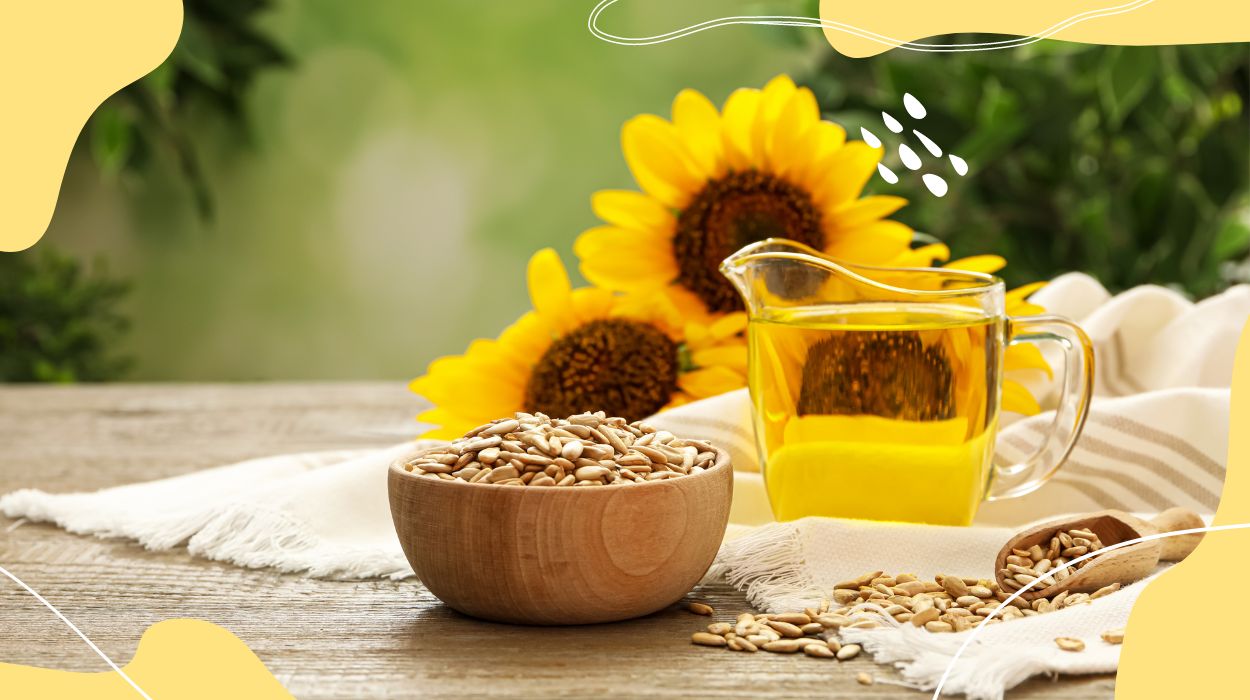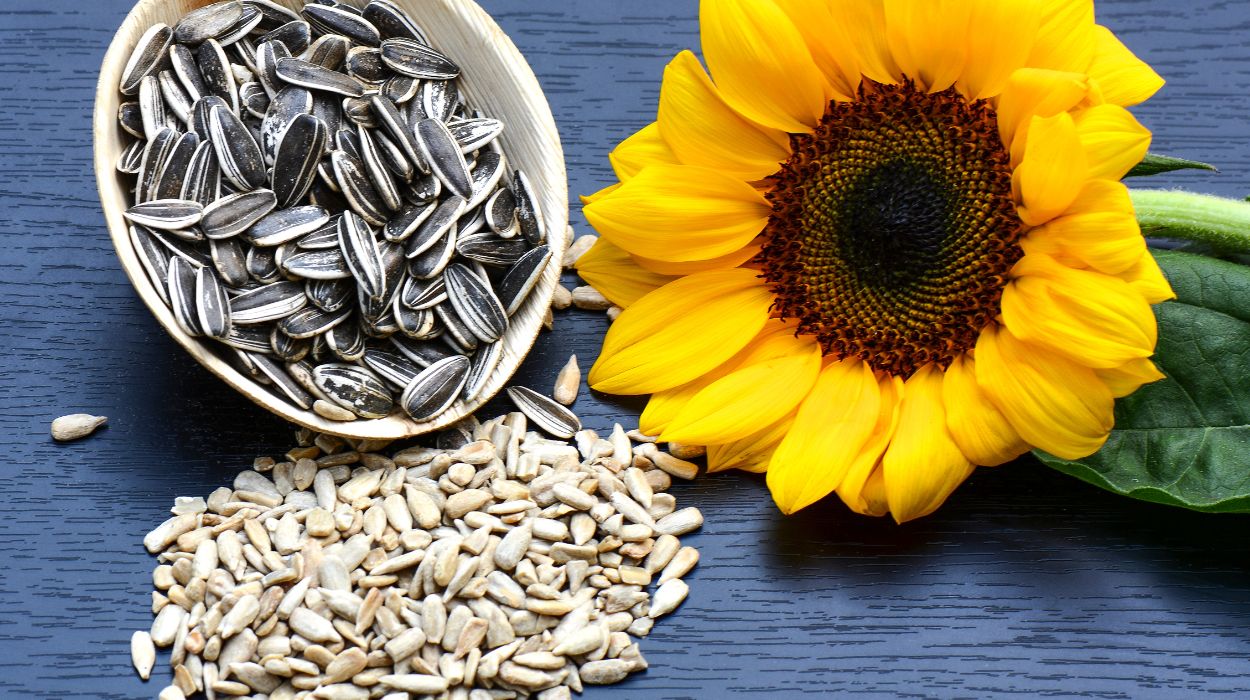 Expert's opinion
Expert's opinion
Expert's opinion
The article is a subjective view on this topic written by writers specializing in medical writing.
It may reflect on a personal journey surrounding struggles with an illness or medical condition, involve product comparisons, diet considerations, or other health-related opinions.
Although the view is entirely that of the writer, it is based on academic experiences and scientific research they have conducted; it is fact-checked by a team of degreed medical experts, and validated by sources attached to the article.
The numbers in parenthesis (1,2,3) will take you to clickable links to related scientific papers.
Are Sunflower Seeds Good For Weight Loss? Benefits & Side Effects 2024

Fall is almost here, and that means the fields are overflowing with beautiful sunflowers and lots of sunflower seeds. Did you know that one sunflower plant can produce as many as one to two thousand seeds?
Sunflower seeds have a mild, nutty flavor and a hard outside yet tender texture inside. They’re often roasted to enhance the flavor, though you can also buy seeds raw. The sight of these beautiful flowers may remind you of eating sunflower seeds with your friends. Possibly seeing how far each of you could spit the shell.
But now that you’re older, you might wonder, are sunflower seeds good for weight loss? This article will discuss the answer to this question, the health benefits of sunflower seeds, nutritional facts, and possible downsides of this popular seed.
Sunflower Seeds For Weight Loss
Sunflower seeds are rich in fiber, protein, and other nutrients that support weight loss by helping you feel fuller for a longer period. The high protein content will also help in preserving muscle mass.
Sunflower seeds are also loaded with monounsaturated and polyunsaturated fats. These are healthy fats that keep you feeling satiated and help to reduce unhealthy cravings.
However, sunflower seeds are also very calorie dense. Therefore, it is easy to overeat them if you are not careful, which can lead to weight gain. Watch your portion sizes to ensure they benefit your health and don’t add inches to your waistline.
Are Sunflower Seeds Good For You?

Like many nuts and seeds, sunflower seeds are high in calories. However, these calories contain a superabundance of protein, healthy fats, vitamins, essential minerals, iron, and fiber.
So to answer the question, are sunflower seeds good for you? Yes, however, best to eat them in moderation, especially if you are trying to lose weight. They are full of nutrition and very tasty. Here are some reasons to add them to your daily routine today.
Benefits Of Sunflower Seeds:
May Reduce Hunger
Sunflower seeds provide lots of healthy fats, plant compounds, and protein. Research shows a balanced diet with higher protein levels wards off hunger better than any other macronutrient (carbohydrates or healthy fats).
Research has not specifically been completed on sunflower seeds but eating nuts or pistachios[1] as snacks[2] has been shown to promote fullness and prevent overeating at the next meal.
Sunflower seeds also contain both soluble and insoluble fiber[3].
Soluble fiber
- Is found in bran, barley, nuts, seeds, beans, lentils, peas, and some fruits and vegetables
- Dissolves in water
- Forms a gel during digestion
- Slows digestion
- Lowers fat absorption and helps with weight management
- Helps to lower cholesterol levels
- Maintains healthy blood sugar (glucose) levels
- Reduces the risk of cardiovascular disease
- Is food for beneficial gut bacteria (prebiotics)
Insoluble fiber
- Is found in vegetables and whole grains.
- Adds bulk to the stool
- Helps food pass quickly through the digestive tract
- Prevents constipation
- Lowers the risk of diverticular disease
- Reduces risk of hemorrhoids
- Reduces the risk of colon cancer
Both types of fiber (soluble and insoluble) will help you to feel fuller longer. This is because fiber increases the time it takes for your foods to be digested.
Additionally, insoluble fiber adds size and thus takes up more space in your stomach and intestines leading to being satiated for longer. These functions lead to fewer cravings, a reduction in hunger, and thus weight management or loss.
Disease and Vision Protection
Sunflower seeds are also a fantastic source of vitamin E, which boasts antioxidant properties. Antioxidants are vital to disease prevention as they fight off free radicals.
Free radicals are unstable molecules in our bodies that, if they become too abundant, can lead to chronic inflammation and disease. Free radicals are responsible for heart disease, diabetes, and cancer formation.
Vitamin E has also shown some positive[4] effects on age-related vision disorders. A trial[4] found that vitamin E, combined with vitamin C, beta carotene, and zinc, offered protection against the growth of macular degeneration. Of note, it seems that vitamin E on its own does not have a profound effect on age-related vision disorders.
Lowers Blood Sugar Spikes
Even though more research is needed, the effects of sunflower seeds and diabetes are promising.
One study[5] looked at people with diabetes who ate sunflower seeds or almonds daily. It showed that the daily intake of sunflower seeds reduced their cardiovascular risk markers significantly.
This study[6] showed that consuming sunflower seeds improved glycemic control in rats and humans. This may be due to sunflower seeds’ protein and fiber content. Both help slow sugar digestion, increasing your blood sugar gradually rather than all at once.
Heart Health
Sunflower seeds are naturally high in vitamin B3 or Niacin[7]. Niacin works in the body as a coenzyme and is necessary for over 400 enzyme reactions. Niacin helps to
- Convert nutrients into energy
- Reduce cholesterol and fats
- Restore DNA
- Develop DNA
- Wield antioxidant effects
Niacin[8] is also beneficial for your heart. It can decrease your bad cholesterol while increasing your good cholesterol. This powerful combination means a lower possibility of developing heart disease.
Of note, some people already use high levels of niacin supplementation instead of statins[9] to help achieve better cardiovascular blood levels. But don’t take niacin to reduce cholesterol levels without discussing it with your doctor first since high levels of this vitamin can cause serious side effects.
Sunflower seeds also contain magnesium. Magnesium is responsible for helping your blood vessels relax and thus helps to lower blood pressure.
A meta-analysis[10] of 11 randomized control trial studies found that taking 365-450 milligrams (mg) daily of magnesium over a 3-and-a-half-month period demonstrated reduced blood pressure in people with chronic medical conditions, diabetes, and prediabetes.
Another review of 10 studies[11] linked greater magnesium intake may protect against the development of high blood pressure.
Protection From Cognitive Diseases
Selenium works alongside vitamin E as an antioxidant[12], protecting cells from free radical damage and oxidative stress. The selenium content in one ounce of sunflower seeds provides almost 25% of the Recommended Dietary Allowance (RDA) for men and 30% of the RDA for women.
Oxidative stress is believed to be a factor in neurological diseases like Parkinson’s, multiple sclerosis, and Alzheimer’s.
For example, studies have found that antioxidants such as selenium improve memory in Alzheimer’s[13] patients. Also, people with Alzheimer’s typically have lower[14] levels of selenium in their blood. Excitingly, antioxidants may improve[15] memory in patients with Alzheimer’s.
Male Benefits
There are some benefits of sunflower seeds that are particularly great for men.
Sunflowers are high in zinc. Zinc is essential for sperm movement and development.
Per a study[16] in the Journal of Reproduction and Infertility, there is a connection between zinc deficiency and infertility (in men). A small one-ounce serving of sunflower seeds supplies 15% of your daily needs for zinc.
Potential Risks
Are sunflower seeds bad for you? While sunflower seeds are generally considered healthy and safe, they bear some potential risks.
Calories and Sodium
Though rich in nutrients, sunflower seeds are high in calories and can be high in sodium.
One serving[17] (around a fourth of a cup) can set you back nearly 200 calories. Unfortunately, it is easy to eat this much in one setting. Consider portioning out one serving before you eat.
Another thing you can do is consume seeds with the shell on, as the act of removing the shell typically takes a while and slows down the number of seeds eaten in one sitting.
If you are watching your salt intake, however, this is not the tactic for you to use. The sunflower seed shell can contain more than your daily sodium allotment in one serving (around 2500 mg).
Additionally, the label will often only consider the nutritional facts of the seed, not the sunflower seed’s shell. Look for a variety of seeds that are labeled as unsalted sunflower seeds.
Cadmium
Cadmium is a heavy metal found in the soil that can damage your kidneys over time if subjected to prolonged exposure.
Sunflowers[18] can soak up cadmium through their stems and deposit it through their seeds. Therefore, they tend to contain higher levels of cadmium.
The World Health Organization recommends[19] eating less than 490 micrograms of dietary cadmium a week. Thankfully, eating one serving of sunflower seeds daily is well below that amount. The problem occurs if a person eats large amounts in one sitting.
Acne
Researchers[20] report a statistically significant relationship between acne severity and consuming sunflower seeds, chocolate, and dairy products. Furthermore, during the study, the acne of study participants in the sunflower group worsened compared to those in the control group, leading the researchers to deduce sunflower seeds worsen acne.
Stool Blockages
As with many nuts and seeds, eating a large number of sunflower seeds, especially with the shell on, can cause blockages[21] in your digestive tract. This is a rare occasion, but it can happen to adults and children.
Allergies
Allergies can happen at any time in a person’s life; therefore, be aware of allergic reaction symptoms. These may include
- Difficulty breathing
- Swelling of mouth, lips, and tongue
- Rashes or lesions
- Vomiting
- Diarrhea
If any of these symptoms occur, notify your healthcare professional immediately.
Nutrition Facts
Nutritional Value of Sunflower Seeds gathered from USDA[22] Nutrient Database.
Raw sunflower seeds, per 1 cup (127 grams)
- Calories: 834 calories
- Protein: 27 grams
- Fat: 71 grams
- Carbohydrates: 21 grams
- Fiber: 13 grams
- Sugar: 1 gram
- Calcium: 100 milligrams
- Phosphorus: 952 milligrams
- Potassium: 875 milligrams
Adding Sunflower Seeds To Your Diet Plan
You can purchase whole sunflower seeds with the shell on or already shelled. If you are buying whole sunflower seeds, crack the outside with either your teeth or fingers and then throw it away. It would be best if you did not eat the shell. If you are looking for a quick and easy snack, shelled sunflower seeds require much less effort.
Here are some ways to add sunflower seeds to your diet
- Mix with dried fruit and other seeds (pumpkin seeds, chia seeds, hemp seeds) and nuts for a healthy trail mix
- Add to homemade bread, muffins, or breakfast bars.
- Create sunflower butter by putting seeds into a blender
- Incorporate into a fruit salad
- Throw some into your yogurt
- Combine with your morning oatmeal or other hot cereal
- Blend into your morning smoothies with chia seeds for added health benefits
You can purchase dry roasted sunflower seeds or raw sunflower seeds. Most people prefer roasted as it intensifies the flavor. If you want to roast your seeds at home, use the following tips
- Soak the seeds in the shell overnight
- Place on a lined cooking pan
- Bake at 300 degrees for 35 minutes
You will know your seeds are roasted when they have a crack down the middle of the shell.
Summary
As you can see, sunflower seeds have several health benefits, including protection from cognitive diseases, promotion of heart health, blood sugar control, and hunger-reduction.
In addition, this tiny seed is full of healthy fatty acids and nutrients like vitamin E and fiber that can help you feel fuller for longer and reduce cravings.
Be sure to watch your portion sizes as it’s easy to overeat sunflower seeds which can cause weight gain. However, as long as you are not overeating, sunflower seeds are an easy, healthy, and affordable addition to your diet.
So next time you want a snack, choose sunflower seeds and other nuts and seeds for a healthy trail mix that will boost your health.
+ 22 sources
Health Canal avoids using tertiary references. We have strict sourcing guidelines and rely on peer-reviewed studies, academic researches from medical associations and institutions. To ensure the accuracy of articles in Health Canal, you can read more about the editorial process here
- Carughi, A., Bellisle, F., Dougkas, A., Giboreau, A., Feeney, M. and Higgs, J. (2019). A Randomized Controlled Pilot Study to Assess Effects of a Daily Pistachio (Pistacia Vera) Afternoon Snack on Next-Meal Energy Intake, Satiety, and Anthropometry in French Women. Nutrients, [online] 11(4), p.767. doi:10.3390/nu11040767.
- Hull, S., Re, R., Chambers, L., Echaniz, A. and Wickham, M.S.J. (2014). A mid-morning snack of almonds generates satiety and appropriate adjustment of subsequent food intake in healthy women. European Journal of Nutrition, [online] 54(5), pp.803–810. doi:10.1007/s00394-014-0759-z.
- Anderson, J.M., Smith, B. and Gustafson, N.J. (1994). Health benefits and practical aspects of high-fiber diets. [online] 59(5), pp.1242S1247S. doi:https://doi.org/10.1093/ajcn/59.5.1242s.
- A Randomized, Placebo-Controlled, Clinical Trial of High-Dose Supplementation With Vitamins C and E, Beta Carotene, and Zinc for Age-Related Macular Degeneration and Vision Loss. (2001). Archives of Ophthalmology, [online] 119(10), p.1417. doi:10.1001/archopht.119.10.1417.
- Richmond, K., Williams, S., Mann, J., Brown, R. and Chisholm, A. (2013). Markers of Cardiovascular Risk in Postmenopausal Women with Type 2 Diabetes Are Improved by the Daily Consumption of Almonds or Sunflower Kernels: A Feeding Study. ISRN Nutrition, [online] 2013, pp.1–9. doi:10.5402/2013/626414.
- Rehman, A., Saeed, A., Kanwal, R., Ahmad, S. and Changazi, S.H. (2021). Therapeutic Effect of Sunflower Seeds and Flax Seeds on Diabetes. Cureus. [online] doi:10.7759/cureus.17256.
- Nih.gov. (2022). Office of Dietary Supplements – Niacin. [online] Available at: https://ods.od.nih.gov/factsheets/Niacin-HealthProfessional/.
- Meyer-Ficca, M. and Kirkland, J.B. (2016). Niacin. Advances in Nutrition, [online] 7(3), pp.556–558. doi:10.3945/an.115.011239.
- D’Andrea, E., Hey, S.P., Ramirez, C.L. and Kesselheim, A.S. (2019). Assessment of the Role of Niacin in Managing Cardiovascular Disease Outcomes. JAMA Network Open, [online] 2(4), p.e192224. doi:10.1001/jamanetworkopen.2019.2224.
- Dibaba, D.T., Xun, P., Song, Y., Rosanoff, A., Shechter, M. and He, K. (2017). The effect of magnesium supplementation on blood pressure in individuals with insulin resistance, prediabetes, or noncommunicable chronic diseases: a meta-analysis of randomized controlled trials. The American Journal of Clinical Nutrition, [online] p.ajcn155291. doi:10.3945/ajcn.117.155291.
- Dominguez, L.J., Veronese, N. and Barbagallo, M. (2020). Magnesium and Hypertension in Old Age. Nutrients, [online] 13(1), p.139. doi:10.3390/nu13010139.
- Amraoui, W., Adjabi, N., Bououza, F., Boumendjel, M., Taibi, F., Boumendjel, A., Abdennour, C. and Messarah, M. (2018). Modulatory Role of Selenium and Vitamin E, Natural Antioxidants, against Bisphenol A-Induced Oxidative Stress in Wistar Albinos Rats. Toxicological Research, [online] 34(3), pp.231–239. doi:10.5487/tr.2018.34.3.231.
- Santos, J.R., Gois, A.M., Mendonça, D.M.F. and Freire, M.A.M. (2014). Nutritional status, oxidative stress and dementia: the role of selenium in Alzheimer’s disease. Frontiers in Aging Neuroscience, [online] 6. doi:10.3389/fnagi.2014.00206.
- González-Domínguez, R., García-Barrera, T. and Gómez-Ariza, J.L. (2014). Homeostasis of metals in the progression of Alzheimer’s disease. BioMetals, [online] 27(3), pp.539–549. doi:10.1007/s10534-014-9728-5.
- Feng, Y. and Wang, X. (2012). Antioxidant Therapies for Alzheimer’s Disease. Oxidative Medicine and Cellular Longevity, [online] 2012, pp.1–17. doi:10.1155/2012/472932.
- Allouche-Fitoussi, D. and Breitbart, H. (2020). The Role of Zinc in Male Fertility. International Journal of Molecular Sciences, [online] 21(20), p.7796. doi:10.3390/ijms21207796.
- Petraru, A., Ursachi, F. and Amariei, S. (2021). Nutritional Characteristics Assessment of Sunflower Seeds, Oil and Cake. Perspective of Using Sunflower Oilcakes as a Functional Ingredient. Plants, [online] 10(11), p.2487. doi:10.3390/plants10112487.
- Andersen, A. and Hansen, H.N. (1984). High cadmium and nickel contents in sunflower kernels. Zeitschrift f�r Lebensmittel-Untersuchung und -Forschung, [online] 179(5), pp.399–400. doi:10.1007/bf01043439.
- Who.int. (2022). Chemicals of public concerns I Cadmium. [online] Available at: https://www.who.int/teams/environment-climate-change-and-health/chemical-safety-and-health/health-impacts/chemicals/cadmium
- Mohebbipour, A., Sadeghi-Bazargani, H. and Mansouri, M. (2015). Sunflower Seed and Acne Vulgaris. Iranian Red Crescent Medical Journal, [online] 17(9). doi:10.5812/ircmj.16544.
- Eitan, A., Bickel, A. and Katz, I.M. (2006). Fecal Impaction in Adults: Report of 30 Cases of Seed Bezoars in the Rectum. Diseases of the Colon & Rectum, [online] 49(11), pp.1768–1771. doi:10.1007/s10350-006-0713-0.
- Usda.gov. (2022). FoodData Central. [online] Available at: https://fdc.nal.usda.gov/fdc-app.html#/food-details/325524/nutrients



